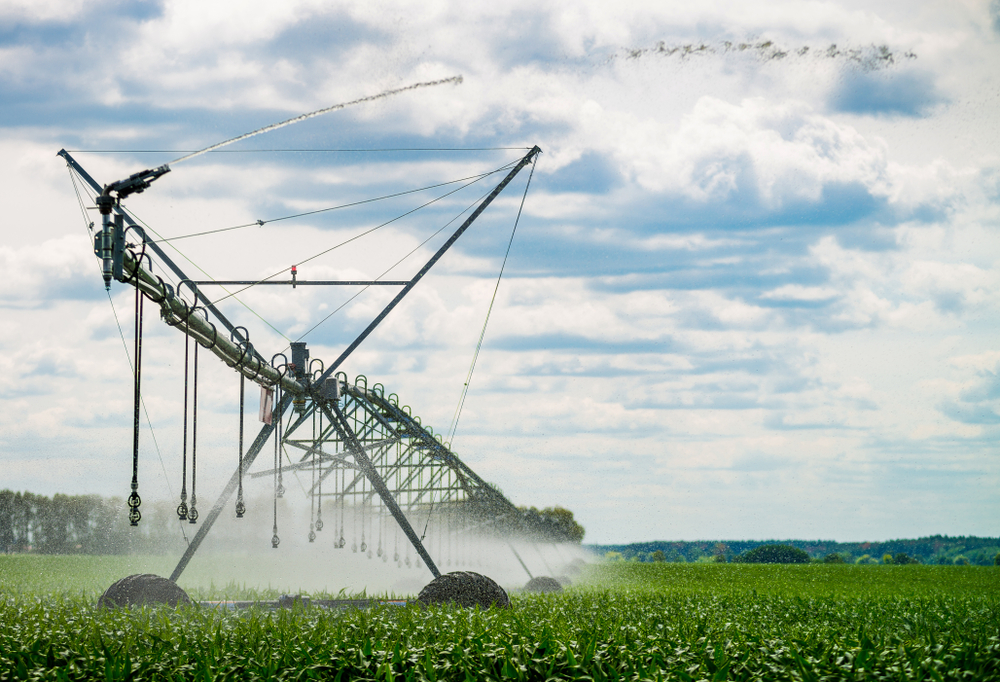It would mean a significant reduction in crop yields, according to a new study.

Many experts agree that sustainable groundwater use is important for the future of agriculture, but doing so will mean a significant reduction in crop yields.
Researchers at Dartmouth College recently studied the impact sustainable water use will have on production potential of major US crops. The study, published in Earth’s Future last month, dives into how the production of corn, soybeans and winter wheat—which account for 52 percent of the country’s irrigated land—could be dramatically reduced if a sustainable water supply was used to grow them.
Many farmers rely on irrigation, which uses groundwater from aquifers—underground water sources naturally fed by rainfall, snowmelt and other water that infiltrates the soil. Depleting the aquifers of water faster than it can refill results in reduced groundwater quantities and, therefore, reduced crop yield potential. Aquifers are relied on not only for agriculture but also for drinking water, and they are essential for healthy lakes and rivers. The depletion of aquifers can negatively impact entire ecosystems. “Sustainable” use of groundwater would mean limiting water uses to meet the rate of natural aquifer recharge. And with more than 50 percent of the West’s land classified as experiencing “extreme or exceptional drought” as of October 2021, the rate of future recharge isn’t particularly hopeful.
[RELATED: Irrigation Is Draining Rivers, Lakes and Streams]
To evaluate how a more sustainable use of groundwater would impact these three major US crops, researchers used a crop model to simulate irrigated agriculture from 2008 to 2012. That model, which used weather data, crop varieties, soil properties and farm management, was then compared to USDA survey data to confirm its accuracy.
The findings show that if the water were to be used in a sustainable manner, a decrease in the production of each crop would be necessary. There would simply not be enough water to nourish the amount of crops already grown. The study simulated the reduction in crop production under four scenarios, ranging from most optimistic to most pessimistic in regards to water amounts available, with the most optimistic simulating the highest possible aquifer recharge percentage. The less optimistic scenarios simulate lower recharge percentages and also account for leaving water in the aquifers to maintain a healthy ecosystem.
For corn, the study found, the “most optimistic” decrease in production would be around 20 percent, while the “pessimistic” simulation would require a 45-percent reduction. For winter wheat, the optimistic reduction would reduce production by 25 percent, with the pessimistic ranking at 36 percent. The optimistic groundwater use scenario for soybeans is comparatively low at six percent, but its worst-case scenario ranks closer with other crop predictions at a 37-percent reduction.
How the numbers would play out in actuality will depend heavily on the quantity of rainfall to feed the aquifers. According to the study, regions that rely on the High Plains aquifer, which are prone to lack of rainfall—including Texas, Kansas and Nebraska—would incur the greatest production decreases with sustainable groundwater practices.
The Mississippi Valley and Midwest regions, which rely less on groundwater extraction due to higher precipitation and humidity levels, would see comparatively less reduction in crop production under a sustainable groundwater model.
Well that is the price you pay for growing crops under ridiculous subsidy schemes and then sibsidize export of that over production so that producers around the world go broke, in their throat cutting efforts to survive the environment has been ruined and rural communities around the world completely destroyed. Thank You USA.
ouch. Franz is certainly right about the ethanol farce not helping things, but I think we need to be frank about today’s “organic” racket too. I’ve converted about 10% of my family’s 175 year old opation to organic because there are enough rich hypochondriacs who seem not to care what food costs. Although for some crops, the yields are respectable, they usually about 75% of normal, and 175% the cost per acre. It burns me up to see the waste of money, water, land, labor and diesel used for theatrical purposes. Our workers dislike the nasty organic pesticides, which make… Read more »
Well that was today’s news of the obvious. The entire premise of intensification is a farce. Sustainable water use is not a choice. Go ahead ignore it, nature will teach you it’s not a choice. At the cost of human life. But, isn’t that a glorious US tradition? Ignoring simple logic, to our peril, should’ve been written into our Constitution.
…supply and demand economics…we export these products for the MONEY…if there was a 25-45% reduction in supply…I believe our food needs would be met and farming would still make money. I don’t believe we have to feed the world…look at what happened in CUBA…the people made the changes and the importers would do the same…there is money on both ends. Farming has created their pollution issues and farmers must fix them…they own it..! One thing to remember is this…The animals are doing nothing wrong…could it be there…OWNERS..?